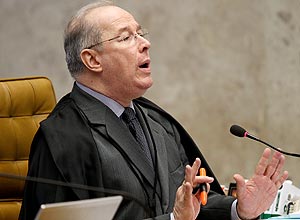Latest Photo Galleries
Brazilian Markets
10h09 Bovespa |
-0,62% | 124.783 |
16h43 Gold |
0,00% | 117 |
10h03 Dollar |
+0,34% | 5,1871 |
16h30 Euro |
+0,49% | 2,65250 |
ADVERTISING
Between Executioners and Gangsters
09/24/2013 - 11h58
Advertising
SUZANA SINGER
ombudsman@uol.com.br
On the Ash Thursday that came out in the media after some of those convicted in the "mesalão" scandal got the right to one more appeal, Folha was out of sync with those who were the most indignant.
In the editorial "This Is No Whitewash," the newspaper took advantage of the vote by Supreme Court Justice José Celso de Mello and supported the theory that, despite the frustration of the "extremely long process," it's better than the arbitrary. "It would be easier if the judicial system divided into lynchers and their accomplices, into executioners and bandits. However, while it may demand our time, tolerance and patience, it is to our credit that our state institutions and our laws do not function in this manner."
By rejecting the theory that giving one more chance to the defendants is an affront to democracy, Folha stood almost alone. The headline on the Rio de Janeiro daily "O Globo" had the lament: "Justice delayed: Supreme Court upholds impunity for the defendants until 2014."
"Agora," the tabloid published by the same company as Folha, printed a big photo of De Mello laughing with the headline "Gangsters in scandal get another chance." Its main competitor, "Diário de São Paulo," wished "Merry Christmas, crooks!" since the sentences should come in 2014.
The Brasilia daily "Correio Braziliense" said, "For the winners, disaster." The website for the weekly news magazine "Veja" said, "Mello did not evolve: defendants will get new trial."
Folha 's main competitor, "O Estado de São Paulo," had neutral coverage, but it asserted in an editorial that if the Supreme Court allows the infringing roadblocks, it would become "an object of profound discredit," would carry "a serious risk... of weakening democratic institutions."
The newspaper was not the only one to place responsibility for the nation's future on the justice's shoulders. "This is the man," said the front page of "Veja" last Sunday over a photo of Celso de Mello with a notice that he "runs the risk of being crucified."
| Pedro Ladeira/Folhapress |
 |
| the newspaper took advantage of the vote by Supreme Court Justice José Celso de Mello and supported the theory that, despite the frustration of the "extremely long process," it's better than the arbitrary |
It's been a long time since you saw so much pressure on a public figure. A good part of the press ripped off the mask, setting aside worries about neutrality, in the name of a bigger objective: preventing the trial from continuing because it would be the equivalent of celebrating impunity for corrupt officials.
Folha did not enter this dance, but it exercised its share of pressure with a poll about the trial, released on Wednesday, "D Day." The survey showed that, in São Paulo, only 50% knew that the Supreme Court would decide about the obstacle - 19% were well informed.
The analysis written by the directors of Datafolha warned about the high degree of lack of knowledge about the process among those interviewed, but the newspaper pointed out only that the majority (55%) were against delaying the verdict. The number was not consistent with the one saying that 79% support immediate imprisonment of the defendants, showing that the judicial mess was not well digested by the population.
Only among the elite, those with the most education, was there a clear majority (72%) for Celso de Mello to not give a new opportunity for those convicted.
The "popular clamor," cited by the justice himself and evoked by so many representatives of "popular opinion" did not exist. The opinions of people in the street are varied, except for the 30 who protested by delivering a pizza to the Supreme Court (to signify displeasure with the judicial "mess") and the protest by five famous actresses.
On the other hand, it's not correct to say that the population believes that the trial was a political process, as the governing Workers Party (PT) argues. Almost everybody believes that the "mensalão" scandal involved real corruption and not simply tax evasion (90%).
The truth is with neither the "executioners" nor the "gangsters," as Folha 's editorial page defined, but some place in the middle of the road, as it usually is.
CHIQUINHO'S STUNT
Playboy Chiquinho Scarpa pulled a good one on the press. He used social networks to say that he would bury his favorite car, a Bentley worth R$ 1.5 million (about US$ $675,000). He put out a photo in which he appeared beside a hole, in the garden at his house, with a car in the background.
Journalists snapped at the bait. Folha reported it on Wednesday, with Scarpa saying that he would follow the "tradition of the pharaohs in Egypt" to bury "their greatest treasure to wait for it in the next life."
Dozens of journalists went to the car's funeral. As the car was being lowered into the hole, Scarpa stopped it to say that he was only trying to promote a campaign to donate organs. It was a way to show that something so precious has no value below the ground.
Besides promoting his cause, Chiquinho exposed how fragile the filters of the press are.
Translated by JOHN WRIGHT
Read the article in the original language
+Latest news in english
- 'Bigode Grosso' Funk is New Fever at Soccer Games
- "[Brazilian Supreme Court Will Hear Appeals from 12 Convicted in the "Mensalão" Scandal":http://www1.folha.uol.com.br/internacional/en/brazil/2013/09/1344210-brazilian-supreme-court-will-hear-appeals-from-12-convicted-in-the-mensalao-scandal.shtml
- From Brazil: Obama loses. Does Dilma win?



